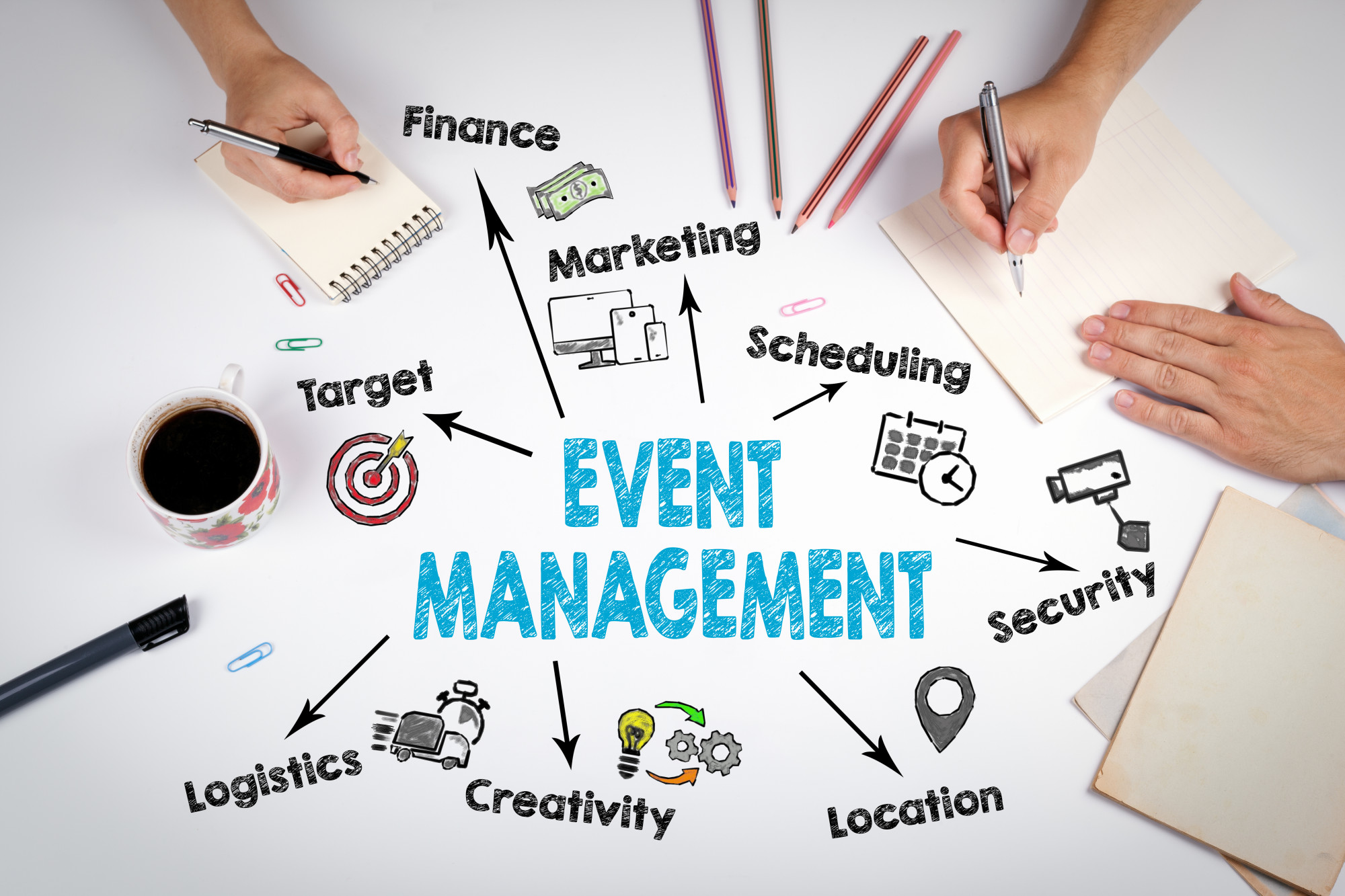How charlotte event companies pivot to evolving event trends
A Deep Dive Into How Event Management Works to Produce Unforgettable Experiences
Event management is a complex self-control that integrates various components to craft remarkable experiences. It calls for a clear understanding of the event's objective and audience. Organizers need to navigate budgeting, logistics, and advertising and marketing to guarantee a smooth execution. Each part plays a crucial duty in attaining the wanted effect. Nevertheless, the trip does not end with the event itself. There are insights to reveal that can shape future undertakings.
The Principles of Event Management
Reliable event management includes an array of crucial concepts that guide the planning and execution of effective events. At its core, it involves recognizing the event's purpose, audience, and wanted results. Recognizing the target group is vital, as it educates choices related to web content, advertising, and logistics.
Budgeting is one more basic element, ensuring that resources are assigned successfully while fulfilling the event's objectives. This includes planning for unanticipated expenses that might arise.
Time management plays an essential duty, as event managers need to establish a thorough timeline to collaborate different tasks and turning points.
Additionally, reliable communication amongst stakeholders, vendors, and team members is crucial to guarantee positioning and prevent misunderstandings.
Threat management should be taken into consideration, with backup plans in place to attend to possible obstacles, therefore enhancing the general experience for guests and assuring a smooth implementation of the event.
Trick Duties in Event Preparation
In event planning, recognizing key functions is necessary for effective execution. The event organizer is accountable for managing logistics and guaranteeing all elements straighten with the vision. Furthermore, reliable vendor management is important for preserving top quality and fostering solid collaborations throughout the preparation process.
Event Planner Responsibilities
An event organizer orchestrates the complicated aspects of event planning, ensuring smooth execution from conception to conclusion. They are accountable for conceptualizing the event style, setting budgets, and producing timelines to maintain the project on the right track. Control with stakeholders, including customers, location managers, and volunteers, is important to straighten assumptions and help with interaction. The coordinator additionally manages logistics, such as event catering, transport, and innovation requires, making certain all components work sympathetically. They carry out website gos to, take care of routines, and troubleshoot issues that may develop throughout the event. Post-event, the planner reviews the event's success, collecting responses and analyzing outcomes to inform future tasks. This diverse function needs solid organizational skills, attention to information, and reliable interpersonal interaction.
Vendor Management Fundamentals
Steering through the landscape of vendor management is crucial for successful event planning. Reliable vendor management involves identifying, selecting, and coordinating suppliers who offer essential services, such as event catering, audiovisual assistance, and design. Event organizers should preserve strong communication with vendors to guarantee that all facets line up with the event's vision. Secret functions consist of the supplier manager, that supervises agreements and arrangements, and the logistics organizer, in charge of on-site arrangement and implementation. It's essential to establish clear assumptions and timelines, fostering a joint environment that boosts the overall experience. By focusing on these aspects, event coordinators can navigate possible challenges, making certain that every information adds to a seamless and memorable event.
Crafting a Vision: Principle Growth

When a vision is developed, it ends up being important to equate it right into workable parts. This includes specifying the ambience, picking proper locations, and establishing the event's design. Collaborating with stakeholders, including enrollers and partners, further improves the concept, guaranteeing that all parties share a linked understanding of the event's function. Ultimately, a strong vision not only enhances participant interaction but also establishes the stage for unforgettable experiences that reverberate long after the event concludes.
Budgeting and Source Allowance
With a clear vision in location, the following action in event management involves mindful budgeting and source allowance. This important phase guarantees that all essential components are funded and lined up with the event's objectives. Event supervisors start by estimating costs connected internet with place option, catering, entertainment, and marketing. They produce an in-depth spending plan that details each category, permitting transparency and accountability.
Source appropriation expands past funds; it likewise includes human resources. Determining group functions, obligations, and timelines is important to guarantee performance. Event managers must likewise consider backups for unexpected costs or modifications in range, establishing a barrier within the budget plan.
Moreover, prioritizing investing on elements that enhance visitor experiences is vital. By purposefully assigning sources, event managers take full advantage of effect while preserving economic control. This disciplined approach not just fosters effective occasions yet additionally constructs credibility and trust with stakeholders and participants.
Logistics: The Backbone of Event Implementation
While budgeting prepares for an occasion, logistics function as its backbone, ensuring that every aspect is carried out smoothly and successfully. charlotte event companies. This encompasses a broad array of activities, consisting of place option, transportation setups, and devices procurement. Reliable logistics management needs meticulous planning and sychronisation to guarantee that all aspects straighten with the event's timeline and goals
Secret elements of logistics consist of inventory management, where supplies and products are tracked to avoid scarcities, and staffing, which entails recruiting and training workers to manage various jobs. Communication is likewise important, as it helps with collaboration among vendors, enrollers, and the event team.

Advertising and Promotion Approaches
Effective marketing and promotion approaches are crucial for maximizing presence and engagement at an occasion, as they create passion and enjoyment among potential individuals. Event supervisors employ a mix of typical and electronic marketing methods to reach their target market. Social media site systems, email campaigns, and targeted advertisements are typically made use of to produce buzz and foster area interaction. Collaborations with influencers or industry leaders can enhance trustworthiness, while involving material such as video clips and endorsements can reverberate with potential guests.
Additionally, leveraging event-specific hashtags and producing shareable graphics motivates organic promotion amongst attendees. Early bird ticket deals and special promotions can incentivize registration, furthermore improving interest. Additionally, a well-designed website that supplies very easy navigation and clear information regarding the event can improve the customer experience. By executing these advertising and marketing and promo strategies, event supervisors can guarantee higher visibility and ultimately create an unforgettable experience for all individuals.

Determining Success: Responses and Analysis
Success in event management rests on robust comments and assessment devices. These procedures are vital for identifying the efficiency of an occasion and determining locations for renovation. By collecting input from participants, coordinators can evaluate complete satisfaction levels, comprehend preferences, and evaluate overall impact. Studies and meetings work as important tools for collecting measurable and qualitative data, enabling complete analysis.
Additionally, evaluating crucial performance indications (KPIs) such as participation rates, engagement degrees, and roi (ROI) provides a clearer image of event success. Post-event debriefing sessions with the planning group additionally contribute insights, fostering a culture of continuous enhancement.
Ultimately, a methodical approach to comments and examination not just enhances future events however also reinforces relationships with stakeholders. By implementing these methods, event managers can produce unforgettable experiences that resonate with individuals and drive continuous interaction.
Frequently Asked Concerns
How Do Event Supervisors Deal With Unexpected Difficulties Throughout an Event?
Event supervisors attend to unforeseen difficulties by important link remaining tranquility, examining the circumstance, and executing backup strategies - charlotte event companies. They interact properly with their group, adapt swiftly, and special info focus on remedies to guarantee the event proceeds smoothly and successfully
What Technology Tools Are Essential for Modern Event Management?
Necessary modern technology devices for contemporary event management include event registration software application, job management applications, guest engagement systems, and analytics devices. These sources enhance processes, improve communication, and boost general event experiences for coordinators and individuals alike.
How Do Cultural Distinctions Influence Event Preparation and Execution?
Cultural differences greatly influence event planning and execution. They influence styles, custom-mades, interaction styles, and assumptions, requiring customized strategies to ensure inclusivity and respect, eventually forming the total experience and success of the event.
What Are the Ethical Factors To Consider in Event Management?
Moral factors to consider in event management include transparency, sustainability, cultural sensitivity, and inclusivity. Organizers have to prioritize justness, respect diverse audiences, lessen ecological impact, and guarantee ease of access to develop responsible and memorable experiences for all participants.
Exactly How Can Sustainability Be Integrated Into Event Preparation?
Sustainability can be integrated into event planning by using green materials, minimizing waste, sourcing regional vendors, carrying out carbon balanced out programs, and promoting digital solutions to lower paper use, therefore improving environmental awareness within the event's framework.